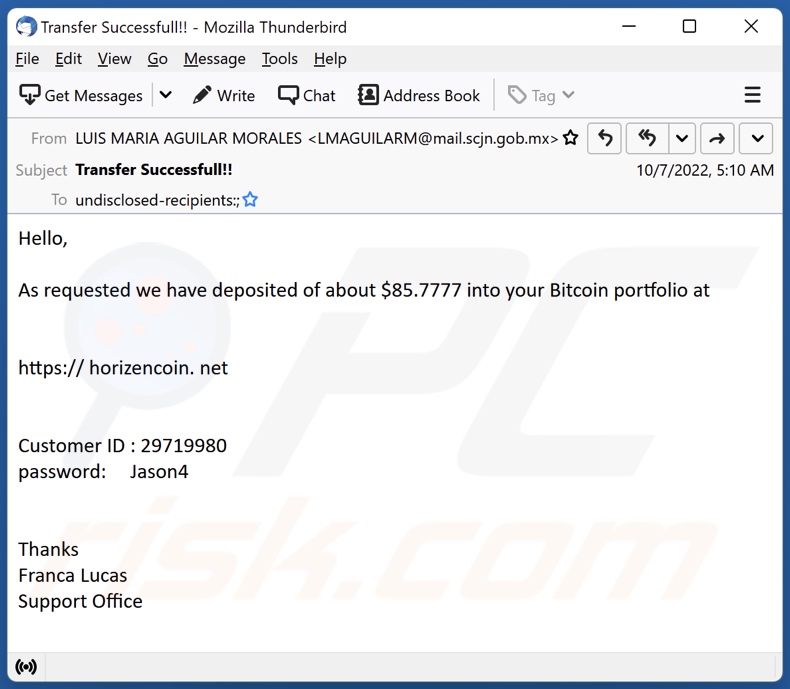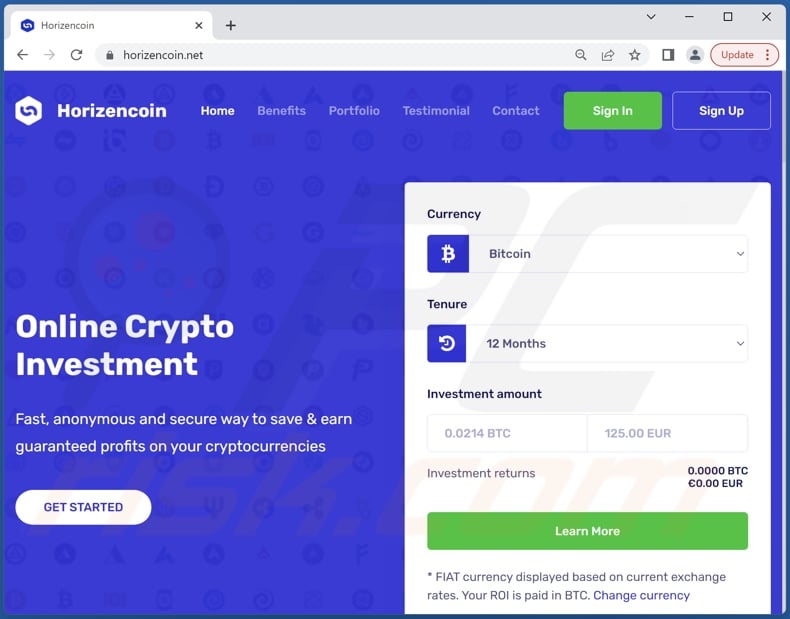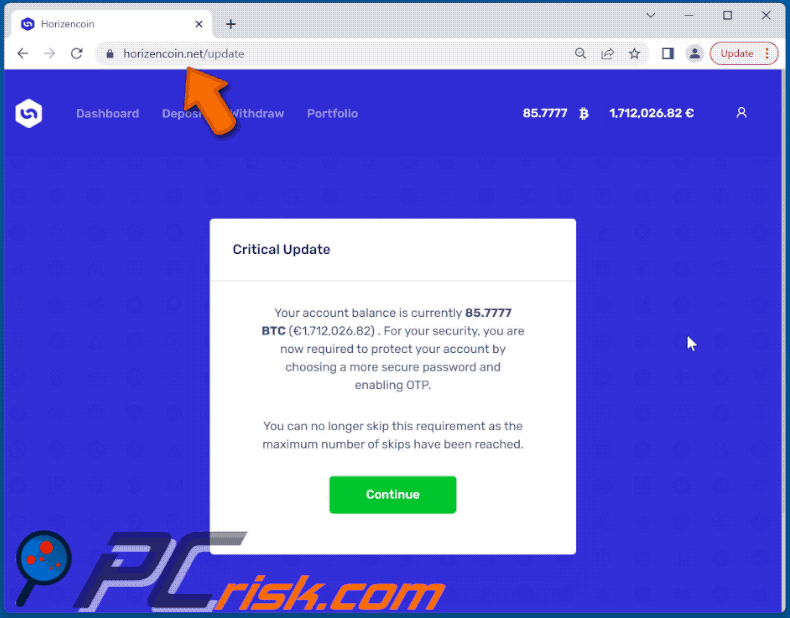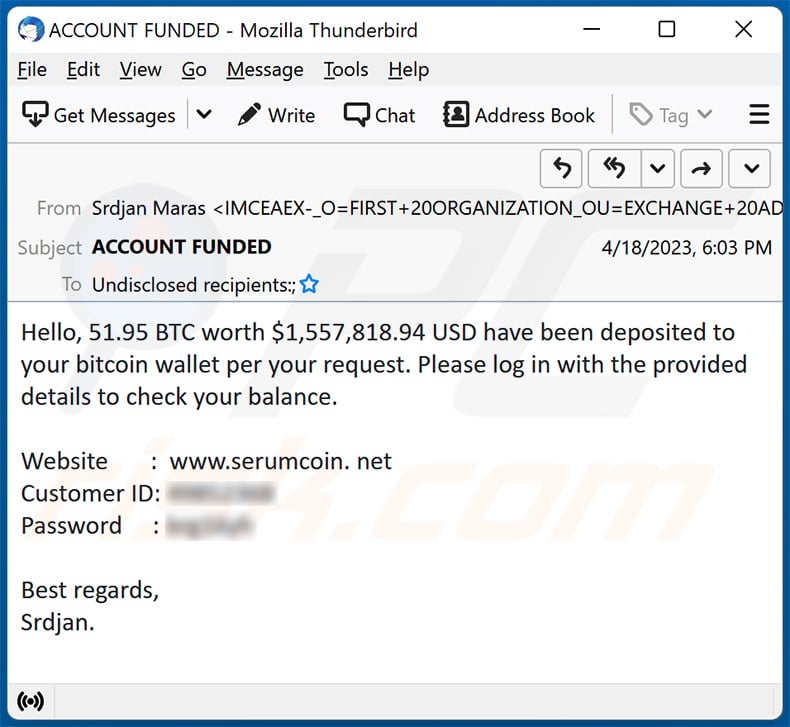Avoid getting scammed by fake "Deposited Into Your Bitcoin Portfolio" emails
Phishing/ScamAlso Known As: "Deposited Into Your Bitcoin Portfolio" spam email
Get free scan and check if your device is infected.
Remove it nowTo use full-featured product, you have to purchase a license for Combo Cleaner. Seven days free trial available. Combo Cleaner is owned and operated by RCS LT, the parent company of PCRisk.com.
What kind of email is "Deposited Into Your Bitcoin Portfolio"?
After inspecting the "Deposited Into Your Bitcoin Portfolio" spam email, we determined that it operates as a phishing scam that can evolve into additional ones. This letter makes false claims about an incoming Bitcoin cryptocurrency deposit that the recipient can accept by following the provided link. However, instead of acquiring funds - victims of this scam can experience severe privacy issues, financial losses, and other serious problems.

"Deposited Into Your Bitcoin Portfolio" email scam overview
The spam email with the subject "Transfer Successfull!!" (may vary) states that per the recipient's request, a deposit of $85.7777 has been transferred to their Bitcoin portfolio. The email contains a link and a Customer ID/ password with which the website is to be accessed.
Following a sign-in with the data from the spam email, the site displays a pop-up clarifying that the bogus account currently holds 85 Bitcoins - a sum that is worth over one million EUR/USD (note that exchange rates constantly fluctuate). The deceptive website states that a new, more secure password must be set and OTP (One-Time Password) enabled for security reasons.
The phishing page records the new password entered into it. While it is against good security practices, many users use the same passwords for multiple accounts, which is likely the scammers' hope.
Cyber criminals can variously misuse stolen accounts. Emails are of particular interest as through them - the content registered with the mail address may also be stolen.
Communication platforms (e.g., emails, social media, social networking, messengers, etc.) can be used to ask contacts for loans or to proliferate malware by sharing malicious files/links - under the guise of the genuine owner. Finance-related accounts (e.g., e-commerce, online banking, digital wallets, etc.) can be used to make fraudulent transactions and online purchases.
Supposedly for OTP reception, the fake website also requests the user to provide their telephone number. Scammers can use this information to facilitate smishing (a type of phishing) and various callback scams (e.g., refund scams, tech support scams, etc.).
The latter may involve the victim being asked to download and open files, which can be malicious and cause system infections. Alternatively, the user may be requested to download an installation setup of legitimate remote access software (e.g., TeamViewer, UltraViewer, etc.) and allow the criminals to access the device remotely.
The bogus reason behind the file download/installation or remote access permission can vary, e.g., the scammers can pretend to offer aid with refund or cancellation processes, malware/hacker removal, product/service purchase, etc. The scams can be quite sophisticated - thus luring victims into believing that they are communicating with support technicians or financial departments of real, existing companies.
To summarize, by trusting emails like "Deposited Into Your Bitcoin Portfolio" - users may experience system infections, serious privacy issues, financial losses, and identity theft.
If you have entered your log-in credentials into a phishing site - immediately change the passwords of all potentially exposed accounts and inform their official support. And if you believe your other private data is at risk (e.g., ID card details, credit card numbers, etc.) - contact the appropriate authorities without delay.
| Name | "Deposited Into Your Bitcoin Portfolio" spam email |
| Threat Type | Phishing, Scam, Social Engineering, Fraud |
| Fake Claim | Per the recipient's request a deposit has been made into their Bitcoin portfolio. |
| Related Domains | horizencoin[.]net |
| Detection Names (horizencoin[.]net) | Avira (Phishing), CRDF (Malicious), CyRadar (Malicious), Kaspersky (Phishing), Sophos (Malware), Full List Of Detections (VirusTotal) |
| Serving IP Address (horizencoin[.]net) | 104.21.17.153 |
| Symptoms | Unauthorized online purchases, changed online account passwords, identity theft, illegal access of the computer. |
| Distribution methods | Deceptive emails, rogue online pop-up ads, search engine poisoning techniques, misspelled domains. |
| Damage | Loss of sensitive private information, monetary loss, identity theft. |
| Malware Removal (Windows) |
To eliminate possible malware infections, scan your computer with legitimate antivirus software. Our security researchers recommend using Combo Cleaner. Download Combo CleanerTo use full-featured product, you have to purchase a license for Combo Cleaner. 7 days free trial available. Combo Cleaner is owned and operated by RCS LT, the parent company of PCRisk.com. |
Spam campaigns in general
We have inspected thousands of spam emails; "Your Email Has Been Restricted", "Gold Fields Bullion Limited email scam", and "Apple Invoice email scam" are merely a couple of our newest finds.
In addition to various scams, this mail is also used to distribute trojans, ransomware, and other malware. These letters are often disguised as messages from legitimate companies, institutions, organizations, service providers, and other entities. Due to how widespread spam mail is, we strongly advise exercising caution with incoming emails and messages.
How do spam campaigns infect computers?
Spam emails can have infectious files attached to and/or linked inside them. These files can be executables, archives, Microsoft Office and PDF documents, JavaScript, etc.
When such a file is executed, run, or otherwise opened - the infection chain is triggered. For example, Microsoft Office documents infect devices by executing malicious macro commands.
How to avoid installation of malware?
We highly recommend being cautious with incoming mail. The attachments and links found in suspicious/irrelevant emails and messages - must not be opened since they can be malicious and cause infections. It is important to use Microsoft Office versions released after 2010, as they have the "Protected View" mode that can prevent automatic execution of macros.
However, malware is not spread exclusively via spam mail. Therefore, we also advise downloading only from official/verified channels and activating/updating software with legitimate tools (illegal activation tools ["cracks"] and third-party updaters may contain malware).
We must emphasize the importance of having a reputable anti-virus installed and kept updated. Security programs must be used to perform regular system scans and to remove threats and issues. If you've already opened malicious attachments, we recommend running a scan with Combo Cleaner Antivirus for Windows to automatically eliminate infiltrated malware.
Text presented in the "Deposited Into Your Bitcoin Portfolio" scam email letter:
Subject: Transfer Successfull!!
Hello,
As requested we have deposited of about $85.7777 into your Bitcoin portfolio at
hxxps:// horizencoin. net
Customer ID : -
password: -
Thanks
Franca Lucas
Support Office
Screenshot of the scam website promoted by the "Deposited Into Your Bitcoin Portfolio" spam campaign:

Appearance of the scam website promoted by this spam campaign (GIF):

Another example of Bitcoin fund deposition-themed spam email:

Text presented within:
Subject: ACCOUNT FUNDED
Hello, 51.95 BTC worth $1,557,818.94 USD have been deposited to your bitcoin wallet per your request. Please log in with the provided details to check your balance.
Website : www.serumcoin. net
Customer ID: -
Password : -
Best regards,
Srdjan.
Instant automatic malware removal:
Manual threat removal might be a lengthy and complicated process that requires advanced IT skills. Combo Cleaner is a professional automatic malware removal tool that is recommended to get rid of malware. Download it by clicking the button below:
DOWNLOAD Combo CleanerBy downloading any software listed on this website you agree to our Privacy Policy and Terms of Use. To use full-featured product, you have to purchase a license for Combo Cleaner. 7 days free trial available. Combo Cleaner is owned and operated by RCS LT, the parent company of PCRisk.com.
Quick menu:
- What is "Deposited Into Your Bitcoin Portfolio" spam email?
- Types of malicious emails.
- How to spot a malicious email?
- What to do if you fell for an email scam?
Types of malicious emails:
![]() Phishing Emails
Phishing Emails
Most commonly, cybercriminals use deceptive emails to trick Internet users into giving away their sensitive private information, for example, login information for various online services, email accounts, or online banking information.
Such attacks are called phishing. In a phishing attack, cybercriminals usually send an email message with some popular service logo (for example, Microsoft, DHL, Amazon, Netflix), create urgency (wrong shipping address, expired password, etc.), and place a link which they hope their potential victims will click on.
After clicking the link presented in such email message, victims are redirected to a fake website that looks identical or extremely similar to the original one. Victims are then asked to enter their password, credit card details, or some other information that gets stolen by cybercriminals.
![]() Emails with Malicious Attachments
Emails with Malicious Attachments
Another popular attack vector is email spam with malicious attachments that infect users' computers with malware. Malicious attachments usually carry trojans that are capable of stealing passwords, banking information, and other sensitive information.
In such attacks, cybercriminals' main goal is to trick their potential victims into opening an infected email attachment. To achieve this goal, email messages usually talk about recently received invoices, faxes, or voice messages.
If a potential victim falls for the lure and opens the attachment, their computers get infected, and cybercriminals can collect a lot of sensitive information.
While it's a more complicated method to steal personal information (spam filters and antivirus programs usually detect such attempts), if successful, cybercriminals can get a much wider array of data and can collect information for a long period of time.
![]() Sextortion Emails
Sextortion Emails
This is a type of phishing. In this case, users receive an email claiming that a cybercriminal could access the webcam of the potential victim and has a video recording of one's masturbation.
To get rid of the video, victims are asked to pay a ransom (usually using Bitcoin or another cryptocurrency). Nevertheless, all of these claims are false - users who receive such emails should ignore and delete them.
How to spot a malicious email?
While cyber criminals try to make their lure emails look trustworthy, here are some things that you should look for when trying to spot a phishing email:
- Check the sender's ("from") email address: Hover your mouse over the "from" address and check if it's legitimate. For example, if you received an email from Microsoft, be sure to check if the email address is @microsoft.com and not something suspicious like @m1crosoft.com, @microsfot.com, @account-security-noreply.com, etc.
- Check for generic greetings: If the greeting in the email is "Dear user", "Dear @youremail.com", "Dear valued customer", this should raise suspiciousness. Most commonly, companies call you by your name. Lack of this information could signal a phishing attempt.
- Check the links in the email: Hover your mouse over the link presented in the email, if the link that appears seems suspicious, don't click it. For example, if you received an email from Microsoft and the link in the email shows that it will go to firebasestorage.googleapis.com/v0... you shouldn't trust it. It's best not to click any links in the emails but to visit the company website that sent you the email in the first place.
- Don't blindly trust email attachments: Most commonly, legitimate companies will ask you to log in to their website and to view any documents there; if you received an email with an attachment, it's a good idea to scan it with an antivirus application. Infected email attachments are a common attack vector used by cybercriminals.
To minimise the risk of opening phishing and malicious emails we recommend using Combo Cleaner Antivirus for Windows.
Example of a spam email:

What to do if you fell for an email scam?
- If you clicked on a link in a phishing email and entered your password - be sure to change your password as soon as possible. Usually, cybercriminals collect stolen credentials and then sell them to other groups that use them for malicious purposes. If you change your password in a timely manner, there's a chance that criminals won't have enough time to do any damage.
- If you entered your credit card information - contact your bank as soon as possible and explain the situation. There's a good chance that you will need to cancel your compromised credit card and get a new one.
- If you see any signs of identity theft - you should immediately contact the Federal Trade Commission. This institution will collect information about your situation and create a personal recovery plan.
- If you opened a malicious attachment - your computer is probably infected, you should scan it with a reputable antivirus application. For this purpose, we recommend using Combo Cleaner Antivirus for Windows.
- Help other Internet users - report phishing emails to Anti-Phishing Working Group, FBI’s Internet Crime Complaint Center, National Fraud Information Center and U.S. Department of Justice.
Frequently Asked Questions (FAQ)
Why did I receive this email?
Spam mail is not personal. Cyber criminals distribute these emails by the thousand with the hopes that at least some recipients will fall for their scams.
I have provided my personal information when tricked by this spam email, what should I do?
If you have provided log-in credentials - change the passwords of all potentially compromised accounts and contact their official support without delay. And if you've disclosed other private information (e.g., ID card details, credit card numbers, etc.) - immediately contact relevant authorities.
I have read a spam email but didn't open the attachment, is my computer infected?
No, just by opening/reading an email - you will not trigger any malware download/installation processes. Devices are infected when malicious attachments or links found in spam mail are opened/clicked.
I have downloaded and opened a file attached to a spam email, is my computer infected?
Whether an infection occurred might depend on the opened file's format. If it was an executable (.exe, .run, etc.) - most likely, yes - the system was infected. While document formats (.doc, .xls, .pdf, etc.) may require additional user interactions (e.g., enabling macro commands) to start downloading/installing malware.
Will Combo Cleaner remove malware infections present in email attachments?
Yes, Combo Cleaner can detect and eliminate almost all known malware infections. It must be mentioned that sophisticated malicious programs typically hide deep within systems - therefore, performing a complete system scan is paramount.
Share:

Tomas Meskauskas
Expert security researcher, professional malware analyst
I am passionate about computer security and technology. I have an experience of over 10 years working in various companies related to computer technical issue solving and Internet security. I have been working as an author and editor for pcrisk.com since 2010. Follow me on Twitter and LinkedIn to stay informed about the latest online security threats.
PCrisk security portal is brought by a company RCS LT.
Joined forces of security researchers help educate computer users about the latest online security threats. More information about the company RCS LT.
Our malware removal guides are free. However, if you want to support us you can send us a donation.
DonatePCrisk security portal is brought by a company RCS LT.
Joined forces of security researchers help educate computer users about the latest online security threats. More information about the company RCS LT.
Our malware removal guides are free. However, if you want to support us you can send us a donation.
Donate
▼ Show Discussion